Did you know over 60% of UK households now own a smart speaker? With Google, Alexa, and Apple leading the pack, choosing the right smart speaker can transform your daily routine. In this ultimate showdown, we’ll break down smart speakers from Google, Amazon Echo (Alexa), and Apple HomePod—helping you discover which device truly stands out, why it matters to your home, and how it fits everyday life. Whether you want better voice control, improved smart home integration, or simply the best sound for your space, this guide is your roadmap to the perfect choice.
Why Smart Speakers Matter for UK Home Owners
Smart speakers are no longer futuristic gadgets—they’re must-have additions in UK homes. Their combination of convenience, connectivity, and voice control has reshaped the way we interact with home technology. With the push for smarter living, these devices act as the hub of the modern home, not just playing music but managing lights, heating, and appliances all with a simple voice command. For UK homeowners, the adoption of smart speakers goes beyond novelty—it’s about making everyday life easier, more efficient, and even more enjoyable.
Choosing the right smart speaker addresses common pain points: wanting to automate simple tasks, control home security remotely, or improve the quality of in-home audio entertainment. The UK’s unique housing landscape—ranging from period terraces to cutting-edge new builds—means smart speaker compatibility, voice clarity, and smart device support are crucial. Whether you’re looking for the best smart speaker for a spacious lounge or compact kitchen, this guide helps you match your needs to the right device for seamless home living.

What You'll Learn About Smart Speakers
An in-depth comparison of top smart speakers: Google, Amazon Echo (Alexa), and Apple HomePod
Key features and benefits that matter to UK homeowners
Expert insights on voice control, compatibility, and smart home device integration
How to decide which smart speaker is best for your home
Understanding Smart Speakers: Features and Benefits
What Are Smart Speakers Used For?
Smart speakers are more than fancy Bluetooth speakers; they’re voice-activated hubs for everything from music streaming to controlling connected home devices. With a simple “Hey Google,” “Alexa,” or “Hey Siri,” you can play music, check the weather, set reminders, or even turn off the lights. For many UK residents, these devices have become the centrepiece for hands-free home automation, offering quick answers via Google Assistant, Amazon Alexa, or Siri while keeping hands free for cooking, tidying, or entertaining the kids.
They’re also gateways to improved safety and comfort. Use your smart speaker as an intercom, check up on security cameras via Echo Show, or make voice calls with no need to pick up your phone. These features are especially appreciated by busy families and elderly users. As options like the Echo Dot, Nest Audio, and Apple HomePod Mini multiply, it’s clear that smart speakers have evolved far beyond “just playing music.”
As you explore the many ways smart speakers can streamline your daily life, it's also worth considering how these devices can help you save on household energy costs. For practical tips on reducing electricity waste—especially from devices left on standby—see our guide on simple ways to save on your energy bills and make your smart home even more efficient.
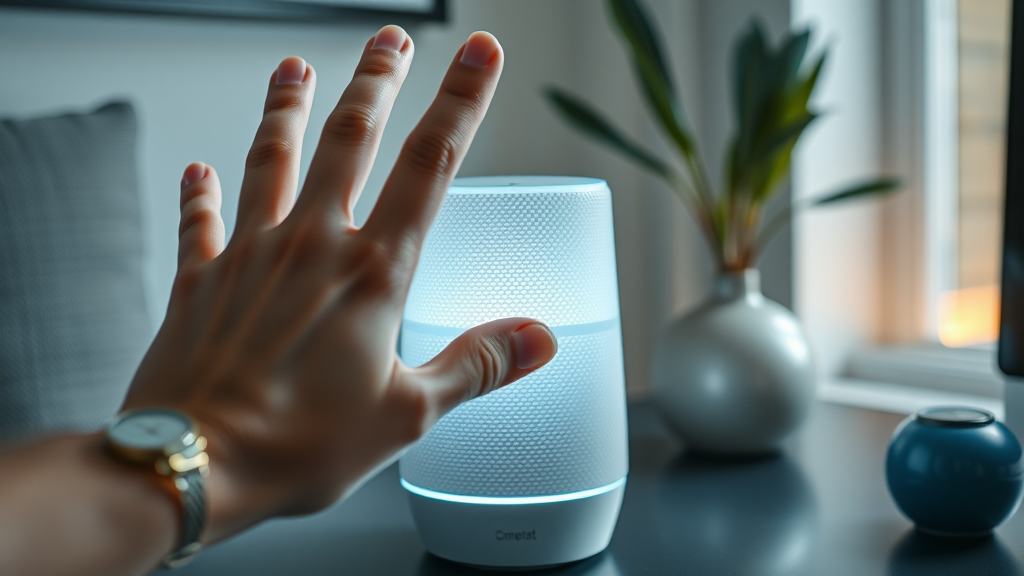
Key Features of Smart Speakers
Voice assistant integration (Google Assistant, Amazon Alexa, Siri)
Smart home device compatibility
High-fidelity audio and spatial audio (Sonos Era, Apple HomePod)
Wireless connectivity (Wi-Fi, Bluetooth)
Multi-room audio capabilities
Comparing the Best Smart Speakers in the UK
Device |
Voice Control & Assistant |
Price (£, typical) |
Audio Quality |
Smart Home Integration |
Compatibility |
|---|---|---|---|---|---|
Google Nest Audio |
Google Assistant |
80 |
Rich sound, improved bass |
Wide (Works with Google Home, many smart home devices) |
Android & iOS |
Amazon Echo Dot |
Amazon Alexa |
50 |
Crisp, clear at moderate volumes |
Extensive (Largest smart home device ecosystem) |
Android, iOS, Windows |
Apple HomePod Mini |
Siri |
99 |
Superb for size, spatial audio |
Best with Apple Home devices (HomeKit) |
iOS, macOS |
Amazon Echo: Leading Smart Speakers with Alexa Voice Assistant
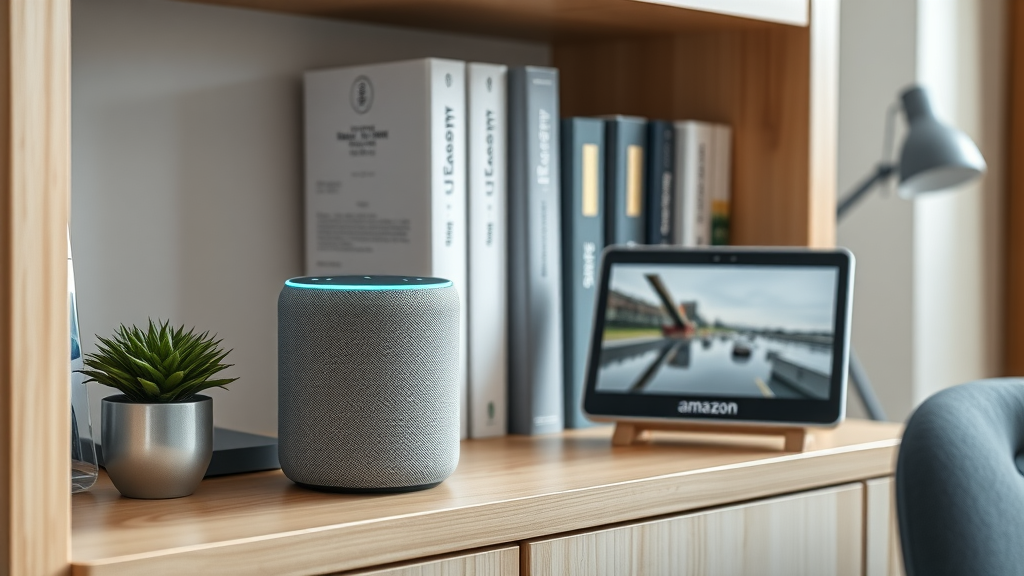
Highlight: Echo Dot and Echo Show
The Amazon Echo lineup—especially the Echo Dot and Echo Show—remains a favourite for those seeking dependable voice control and affordable smart home entry points, making it one of the best smart speaker options available. The Echo Dot packs a surprising punch for its compact size, making it one of the best smart speakers for bedrooms or kitchens seeking quality sound and voice assistant capabilities. Meanwhile, the Echo Show adds a vibrant screen, perfect for video calls, recipes, or visual notifications, setting it apart from many smart speaker rivals.
Aside from voice assistant smarts, the Amazon Echo ecosystem covers nearly every home device, offering extensive smart home integration with lighting, heating, plugs, security cameras, and more. Integration with Amazon Alexa means you can build complex routines, group device controls, or even use voice commands to order groceries. If you’re looking for smart speakers that anchor a broad smart home setup, Echo remains a top contender.
Pros and Cons of Amazon Echo Smart Speakers
Extensive smart home device ecosystem
Affordable options (Echo Dot)
Good voice assistant capabilities with Amazon Alexa
Privacy concerns (always-listening microphones)
"Amazon Echo remains the top choice for hands-free home automation and broad device support." – Tech Analyst
Google Nest Audio: Smart Speakers with Google Assistant
Highlight: Google Nest and Google Home Lineup
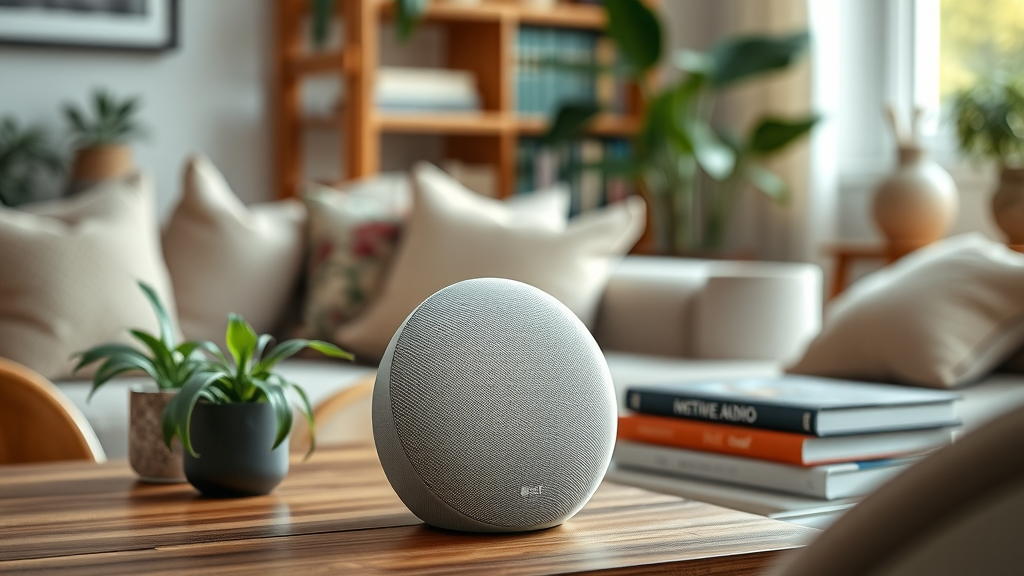
If search smarts and seamless integration with Google Home are high on your wish list, Google Nest Audio stands out as a top choice among smart speakers. The Google ecosystem excels at answering complicated queries, setting reminders, and pulling together information using Google Assistant. The Nest Audio itself delivers richer sound and greater volume than its predecessors, rivalling the Sonos Era for casual listening and voice clarity.
Paired with Google Home apps, the Google Nest Audio connects with a vast array of smart home devices from different brands, and its routines feature lets you launch multiple actions with a single phrase. For many UK homeowners already invested in Google’s platform or using Android devices, Google Nest Audio represents a natural—and often easy—upgrade to their smart home.
Pros and Cons of Google Nest Smart Speakers
Exceptional search, reminders, and integrations (Google Assistant)
Strong compatibility with smart home device platforms
Limited third-party skills compared to Amazon Echo
Audio quality improved in Nest Audio
"Google Nest Audio delivers the smartest responses and feels like a true digital home assistant." – Home Tech Reviewer
Apple HomePod Mini: The Premium Choice for Apple Home Users
Spotlight: Apple HomePod and HomePod Mini
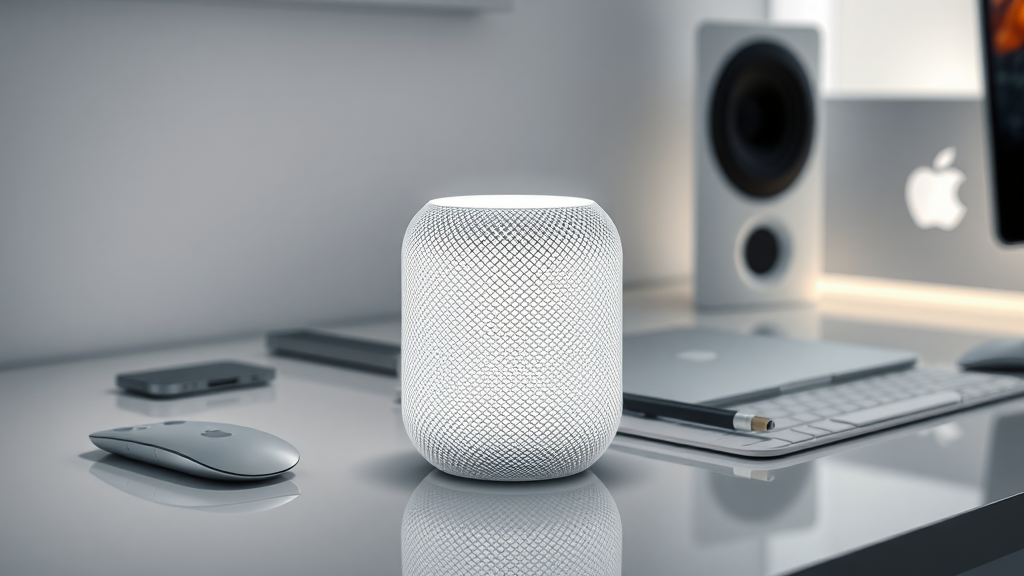
The Apple HomePod Mini is designed for users loyal to the Apple Home ecosystem who want superior audio quality and spatial audio in a compact, chic design. Apple’s HomePod Mini emphasizes high standards, featuring spatial audio and support for Apple Music that audiophiles and design-conscious users love. Tight integration with iOS and Apple Home (HomeKit) ensures device setup is simple and privacy is paramount with on-device processing for as many smart tasks as possible.
While the HomePod Mini has fewer smart home integrations outside of Apple’s platforms compared to Alexa or Google, it shines where it counts: immersive sound, responsive voice assistant (Siri), and reliable daily performance. If your home already runs on iPhones, iPads, and Macs, Apple’s ecosystem will reward you with seamless control, strong privacy features, and beautiful design.
Pros and Cons of Apple HomePod Smart Speakers
Superb spatial audio and sound quality
Advanced privacy features
Limited smart home device compatibility outside Apple HomeKit
Premium price point
"If sound quality and privacy matter, Apple HomePod Mini leads the way among best smart speakers." – Audio Specialist
Features Comparison: Smart Speakers Head-to-Head
Feature |
Amazon Echo |
Google Nest Audio |
Apple HomePod Mini |
|---|---|---|---|
Voice Control / Assistant |
Amazon Alexa |
Google Assistant |
Siri |
Smart Home Integration |
Extensive (Works with most brands) |
Wide, especially with Google devices |
Best with Apple Home devices (HomeKit) |
Audio Output |
Crisp, well-balanced |
Rich sound, enhanced bass |
Hi-fi, spatial audio |
Price Range (£) |
~35–100 |
~70–90 |
~99 |
Device Compatibility |
Android, iOS, Windows |
Android, iOS |
iOS, macOS |
Supported Streaming |
Amazon Music, Spotify, Apple Music |
Spotify, YouTube Music, Apple Music |
Apple Music, Spotify |
Multi-room Audio |
Yes |
Yes |
Yes |
Best For |
Broad home automation, budgets |
Google-centric homes, search |
Premium sound, Apple fans |
Voice Control, Smart Home, and Device Integration
Setting Up Your Smart Home with Smart Speakers

Getting started with smart speakers like the Echo Dot, Google Nest Audio, or Apple HomePod Mini is easier than ever, thanks to simple setup processes and broad compatibility with home devices. Using your selected device—whether it’s an Echo Dot, Google Nest Audio, or Apple HomePod Mini—simply connect to Wi-Fi and follow prompts on the official app (Alexa, Google Home, or Apple Home). Most smart speakers support a wide array of home devices: smart lights, switches, thermostats, and even security systems. Once linked, you can automate daily routines, such as dimming lights or setting the thermostat with just a voice command or scheduled routine.
For homes already using platforms like Google Nest or Amazon Echo, integration can be as simple as plugging in another device. The true magic unfolds with multi-room audio, group announcements, or sophisticated routines—set up in mere minutes via the app. Homeowners can also enjoy added accessibility, remote controls, and peace of mind through voice-activated security features and smart device monitoring, making the modern smart home safer and smarter than ever.
Voice Assistant Features: Google Assistant, Amazon Alexa, and Siri
Google Assistant excels at search and reminders
Amazon Alexa boosts device compatibility
Siri on Apple HomePod focuses on privacy and Apple integration
Audio Performance: Which Smart Speaker Sounds Best?
Hi-Fi Audio and Spatial Audio in Modern Smart Speakers
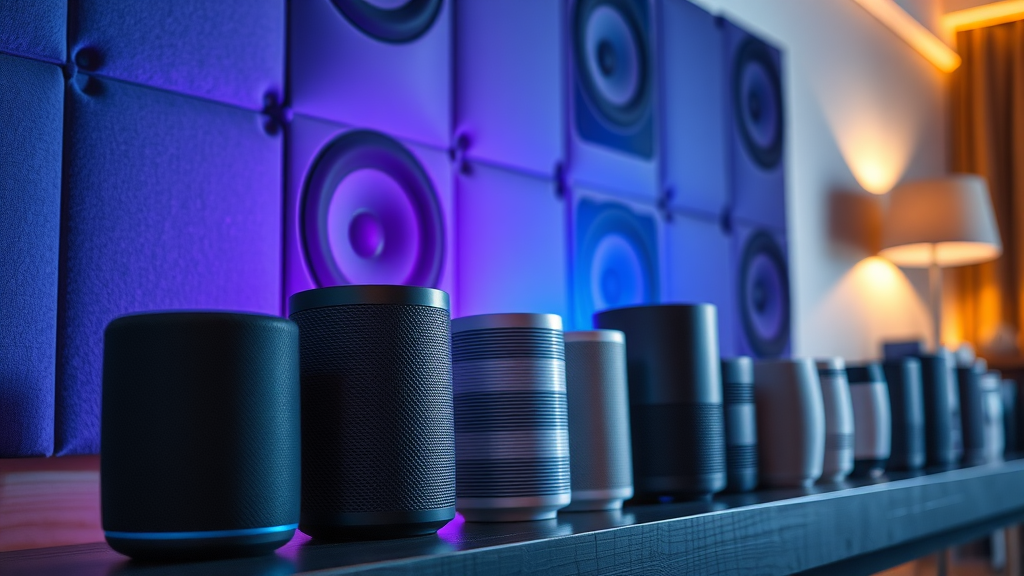
When choosing the best smart speaker for your home, audio performance is just as important as voice smarts. The Echo Dot offers great clarity for its size, making casual background listening or podcasts a breeze. However, the Google Nest Audio brings deeper bass and a warmer sound, perfect for larger rooms and a step up for those who regularly play music across their home. Audiophiles will be drawn to the Apple HomePod Mini and Sonos Era speakers, both praised for superior spatial audio and immersive sound that fills the room—making them among the best smart speakers for high-fidelity audio experiences.
Features like multi-room synchronisation, spatial audio, and lossless streaming are now common among premium speakers. While the distinctions can be subtle to novice ears, dedicated smart speaker users often notice a fuller, richer listening experience on Apple's and Sonos’s devices, with the HomePod Mini setting a high bar for compact speakers. Ultimately, your choice comes down to whether you favour deep integration with other tech or pure listening pleasure.
"Audiophiles will appreciate the advances in spatial audio provided by leading smart speakers." – Tech Audio Authority
The Role of Wi-Fi in Smart Speaker Functionality
Do Smart Speakers Need Wi-Fi?

Most smart speakers, including popular models like the Echo Dot and Google Nest Audio, rely on Wi-Fi to unlock their true power and enable advanced voice assistant features. While some models have basic Bluetooth features for streaming audio directly from your phone, Wi-Fi is crucial for advanced voice commands, smart home device control, and accessing streaming music services like Apple Music and Spotify. Without a stable Wi-Fi connection, capabilities are limited: you won’t get real-time search results from Google Assistant, Alexa won’t control your smart home, and you’ll miss out on multi-room audio functionality.
Wi-Fi also powers seamless updates, new features, and the ability for multiple family members to connect personal accounts to a single device. Although it’s possible to use these devices strictly as a bluetooth speaker in a pinch, going Wi-Fi-free turns a smart speaker into a much simpler gadget. In the modern UK home, robust Wi-Fi is a must to enjoy everything these speakers have to offer.
Smart Speaker Security and Privacy Concerns

Data collection practices
Microphone muting and privacy controls
Brand reputation for protecting user data
"Smart home privacy remains a top concern—always review privacy policies and device settings for your smart speakers." – Security Analyst
Expert Recommendations: The Best Smart Speakers for UK Home Owners
Best overall: Amazon Echo (Amazon Alexa)
Best for Google Home integration: Google Nest Audio
Best for Apple users: Apple HomePod Mini
People Also Ask: Smart Speakers FAQ
What are smart speakers used for?
Smart speakers are used for playing music, setting alarms or reminders, answering questions, managing daily schedules, and controlling smart home devices such as lights, thermostats, and security cameras. They offer hands-free convenience; you can simply ask questions, play your favourite songs, check news or weather, or send voice messages, all through simple voice commands.
Is it worth getting a smart speaker?
Yes, getting a smart speaker is worth it for most UK homeowners, especially if you value convenience and smart automation. These devices can streamline daily routines, enhance home security, and provide fun entertainment—all powered by voice control. They are increasingly affordable and integrate with a wide range of home tech, bringing added value far beyond their cost.

What is the best smart speaker in the UK?
The best smart speaker in the UK depends on your specific needs. If you want the widest device compatibility and value, the Amazon Echo range (like Echo Dot) is often recommended. For excellent integration with Google services and search, Google Nest Audio is top-rated. If sound quality and privacy are your priorities within the Apple ecosystem, choose the Apple HomePod Mini.
Do smart speakers need Wi-Fi?
Yes, most smart speakers need Wi-Fi to access their core features: voice assistant queries, smart home device control, music streaming, and updates. Some can act as basic Bluetooth speakers without Wi-Fi, but all voice-activated smart functions depend on an internet connection.
Smart Speaker Buying Guide: Key Takeaways
Compare based on smart speaker compatibility, audio performance, price, and integration
Consider privacy policies and regular updates
Assess home automation needs before buying
FAQs: Everything You Want to Know About Smart Speakers
How do I set up my smart speaker?
Can smart speakers work together in one home?
Are there parental controls available?
What streaming services are supported?
Do smart speakers support multi-room audio?
Conclusion: Which Smart Speaker is Best for Your Home?
The best smart speaker for your home depends on your priorities: Amazon Echo for overall versatility and extensive smart home integration, Google Nest Audio for seamless Google Assistant search and Google Home compatibility, and Apple HomePod Mini for premium spatial audio and privacy within the Apple Home ecosystem.
If you’re inspired to make your home smarter and more efficient, why not take your next step by exploring broader energy-saving strategies? Beyond choosing the right smart speaker, upgrading your home’s energy profile can deliver lasting comfort and savings. Discover how retrofitting your property for energy efficiency can complement your smart tech investments and future-proof your living space—dive into our expert guide on retrofitting Scottish homes for energy efficiency to unlock even more value from your modern home.
We'd love to see your comments on this?
To further enhance your understanding of smart speakers and their integration into daily life, consider exploring the following resources:
“The best smart speakers of 2025, tried and tested” by CNN Underscored provides comprehensive reviews and comparisons of the latest smart speaker models, helping you make an informed decision based on features, performance, and value. (cnn.com)
“What Is a Smart Speaker? Here’s Everything You Need to Know” by Digital Trends offers an in-depth look at smart speaker functionalities, including voice assistant capabilities, smart home integration, and audio performance, guiding you through the essentials of these devices. (digitaltrends.com)
If you’re serious about integrating smart speakers into your home, these resources will provide valuable insights to help you choose the right device for your needs.
 Add Row
Add Row  Add
Add 





Write A Comment